|
|
|
Sort Order |
|
|
|
Items / Page
|
|
|
|
|
|
|
| Srl | Item |
| 1 |
ID:
170634
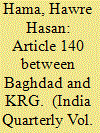

|
|
|
|
|
| Summary/Abstract |
The Iraqi state and the Kurds have always been at the odds over the territory around Kirkuk, particularly following the discovery of oil in the province in 1927. Both sides have claimed ownership of the province since that time and have sought to gain advantage over the other through various means. The region was subjected to a forced demographic change under the Arabisation policy during the reign of Ba’ath Party between 1968 and 2003. Following the overthrow of Saddam’s regime in 2003, the status of Kirkuk was to be constitutionally and peacefully resolved according to Article 58 of the 2004 interim constitution and then Article 140 of the 2005 permanent constitutions, which called for normalisation, a census, and a referendum in Kirkuk and other disputed areas to determine the will of their residents. Practically, however, various Iraqi governments and the two dominant Kurdish parties, the Patriotic Union of Kurdistan and the Kurdistan Democratic Party, were able to politicise implementation of Article 140. Although each blame the other, all share responsibility for the lack of implementation. This research investigates that experience and argues that the joint administration is the optimal scenario in the short run and independent region within the Iraqi state would be the best-case scenario in the long term.
|
|
|
|
|
|
|
|
|
|
|
|
|
|
|
|
| 2 |
ID:
170631
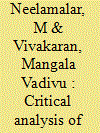

|
|
|
|
|
| Summary/Abstract |
Jihadism’ (also known as the jihadi movement) is a popular term that signifies the Islamic terror movement which thrives on extremist ideologies and violence. In addition to the conventional practices, the online medium is currently being employed for disseminating these extremist ideologies across the globe. Radicalisation and recruitment of geographically dispersed individuals as ‘jihadists’ for supporting Islamic terror activities tend to be the primary intent for using the digital platforms as the medium of communication in this context. One such initiative by the Lashkar-e-Taiba of Jammu and Kashmir was the release of the ‘Wyeth: The Resistance in Flow’, an e-magazine which was launched on April 2018. The first issue which was posted with an open access option was primarily designed to influence the Indian youth population through the radical interpretations of Islam. Hence, it is crucial to analyse and understand the jihadi discourse of the Wyeth magazine in order to curb and counter-attack such initiatives at its initial phase. For this purpose, the present study aims to examine the content of the Wyeth magazine and analyse the basic traits of the jihadi propaganda and its potential to aid in the self-radicalisation process.
|
|
|
|
|
|
|
|
|
|
|
|
|
|
|
|
| 3 |
ID:
170629
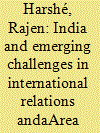

|
|
|
|
|
| Summary/Abstract |
This article captures a bird’s eye view of International Relations and Area Studies by offering a range of ideas and arguments from diverse phases including the current phase of globalisation. After exploring the nature of links between the two fields, it reflects on globalisation, looks at the prominent theories in international relations critically before moving on to discuss areas such as Latin America and Sub-Saharan Africa. Further, by shedding light on inter-area relations, it grapples to find a way to define an area. By treating India as an area in its own right, it relates India to different regions of Asia. It essentially argues that scholars in India need to evolve innovative concepts and theories by doing inter-disciplinary research that are useful for knowledge building exercises as well as policy think tanks.
|
|
|
|
|
|
|
|
|
|
|
|
|
|
|
|
| 4 |
ID:
170630
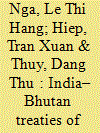

|
|
|
|
|
| Summary/Abstract |
This article is an attempt to relook at the treaties of 1949 and 2007 between India and Bhutan and argues that the 2007 Treaty is the outcome of the evolution and maturity of Bhutan as an independent and sovereign state, that it is imperative for India to make constant adjustments in its foreign policy towards Bhutan to secure its influence in the tiny but important country and maintain the strength of India–Bhutan bilateral relations. From the side of Bhutan, it is also important to have an ‘alliance shelter’, and India is best suited to meeting Bhutan’s needs for political, economic, societal and strategic shelter.1 By using a historical approach, this article shows why it was necessary for the two countries to renew the 1949 Treaty in the first decade of the twenty-first century. The article uses historical methodology, in combination with interdisciplinary methods such as comparative analysis, generalisation, and expert interviews. Major sources for the paper include the texts of the Treaties, speeches by political leaders and published articles and books by international writers, including writers from India, Bhutan and Vietnam.
|
|
|
|
|
|
|
|
|
|
|
|
|
|
|
|
| 5 |
ID:
170636


|
|
|
|
|
| Summary/Abstract |
Treaty of Lisbon has contributed significantly to the development of the European Union (EU) institutions. It has abolished the EU pillars system and has made crucial changes to the implementation of external policies of the Union. This article tracks the evolution of the post of High Representative of the Union for Foreign Affairs and Security Policy, starting from its introduction by the Amsterdam Treaty, until the reforms introduced by the Treaty of Lisbon, and also analyses the challenges it is facing, on its path to implement its mandate.
|
|
|
|
|
|
|
|
|
|
|
|
|
|
|
|
| 6 |
ID:
170632
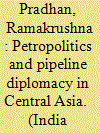

|
|
|
|
|
| Summary/Abstract |
The fight for hegemony in Central Asia has existed for ages. Strategically placed between two nuclear powers—Russia and China—and geopolitically located at the heart of Eurasia, Central Asia has always remained in global limelight. Even after the disintegration of the USSR, the geopolitical importance of Central Asia never waned down, instead emerged as a grand chessboard for regional and extra-regional player for the immense opportunities it has offered in the form of widely untapped natural resources and geostrategic leverages. Importantly, it has emerged as the latest geological landscape for the energy crunch countries as potentially new and non-OPEC source of oil and natural gas. In the quest for energy security and diversity of supply sources by the energy consumers, the heartland region has witnessed a new great game in the scramble for resources. This accentuated struggle for oil and energy in the region has further led to aggressive foreign policy formulations and strategic calculation by countries like the United States, China, European Union, Japan, Israel, Iran, Pakistan and India, to which many now call as the New Great Game for not just controlling but administering the energy resources of the region. The bottom line of the New Great Game unlike the previous version is essentially played out around petropolitics and pipeline diplomacy. It is in this context this research article makes a modest attempt to examine the energy factor in the geopolitics of Central Asia and tries to figure out the position of India in the epic quest for oil in the traditional bastion of Russia and the new grand chessboard of China and the United States.
|
|
|
|
|
|
|
|
|
|
|
|
|
|
|
|
| 7 |
ID:
170633
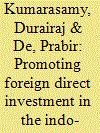

|
|
|
|
|
| Summary/Abstract |
Indo-Pacific construct has picked up a motivating pace in recent years. Several countries across the world have shown their interest in joining the Indo-Pacific region. Indo-Pacific region has been the world’s leading source and destination of foreign investment. This article analyses the trends in investment, bilateral and multilateral investment engagements and investment barriers and presents a way to promote foreign direct investment (FDI) in the Indo-Pacific region. It also examines India’s investment relations with some of the Indo-Pacific countries. Further, it looks into the inter-linkages between FDI and global value chain, given that multinational firms play a significant role in bringing international sourcing, technology sharing, and production networking across countries.
|
|
|
|
|
|
|
|
|
|
|
|
|
|
|
|
| 8 |
ID:
170637
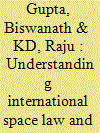

|
|
|
|
|
| Summary/Abstract |
The status and liability of non-governmental entities for commercial use of outer space activities on behalf of space launching states are not very clear under the existing space law regimes. Non-governmental entities are those who carry private space activities such as commercial launching, supplying different equipment or parts to space agencies and manufacturing spacecraft and satellite. The possible litigation relating to the commercial activities are mainly the financial consequence of damage caused and also the technical complications that private entities face in case of supply of defaulted parts to the space agencies. According to Article VI of the Outer Space Treaty 1967 and Articles II and III of Liability Convention 1972, launching country is liable for any activities in outer space. Even in the case of non-governmental activities, the launching state is liable. Therefore, in the event of any commercial activity from any sovereign states, the state is liable for any accidents and consequential damages.
This article focusses on specific issues such as liability for commercial outer space activities of nongovernmental entities in the existing international space law regimes. It explores the applicable principle of space law and international law in outer space activities. The work also focusses on the impact on space liability regime as well as on the legal efficiency of the links between private entities and state liability. This exercise is important in the background of the increasing number of private spacecrafts scheduled for launching in the future.
|
|
|
|
|
|
|
|
|
|
|
|
|
|
|
|
| 9 |
ID:
170635


|
|
|
|
|
| Summary/Abstract |
The purpose of this article is to analyse the invasion of Iraq in 2003 and its repercussions for humanity from the perspective of Human Security. In addition, the aim is to focus on the international systemic problems in the UN on the basis of Human Security. The Human Security approach is expected to bring new insights both to the analysis of what happened to Iraq and its people and how the ‘noble’ aims of the US invasion brought about just the opposite outcomes. It is argued that Iraqis and the country’s future should be thought in the context of Human Security rather than abstract ideals of democratisation and emancipation.
|
|
|
|
|
|
|
|
|
|
|
|
|
|
|
|
|
|
|
|
|